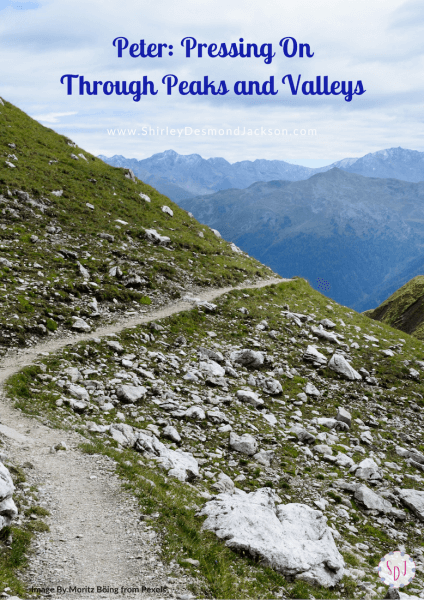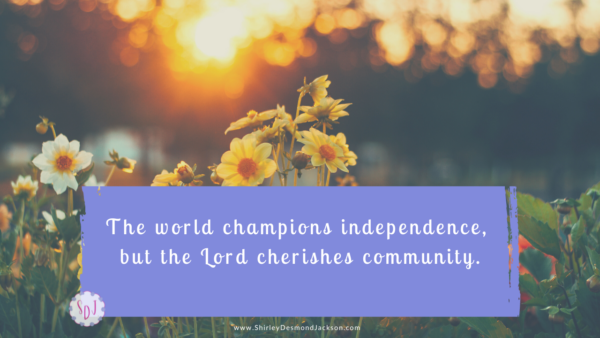
Subscribe to receive a FREE Bible Study!
Share this page

Choosing Community In A World That Champions Independence
February 28, 2024
Rejoice with those who rejoice; mourn with those who mourn. — Romans 12:15 (NIV)
“Why can’t I just live by myself and do my research? It would be so much easier.” My friend’s question was rhetorical. She knows, as I do, that God created us to live in community with others. But just because something is true doesn’t mean it’s easy. Often it’s more difficult.
From the very beginning God intended for us to live and work with others. He created Eve to be a suitable helper for Adam (Genesis 2:18). Reading through the Old Testament shows me that through all their rich history, the Israelites lived in community. Together they participated in worship, reading of Scripture, prayer, religious festivals, weddings, and funerals. One of the harshest experiences they could endure would be to be placed outside of their community.
With The Lord’s Prayer, Jesus emphasized the importance of community. The prayer is a communal one, addressing Our Father and asking Him to give us our daily bread, and to forgive our debts as we forgive our debtors (Matthew 6:9-13). After Jesus ascended to heaven, the first Christians engaged with each other in community (Acts 2:42-47).
In contrast, our culture esteems individualism and independence. And as my friend noted, people are often unpredictable and difficult to understand. Differing opinions and passions create conflict. And none of us escape the pain of relationships gone awry. I never could deny the truth of God’s desire for us to live in community, but I struggled to understand why He would want this. So for years I defined living in community as letting others need me, but never wanting to admit my need for others. I’ve since learned denying my need doesn’t negate it.
I reflected on all of this last weekend as my husband and I attended a young friend’s track competition. With others from our local church community, we cheered for her and her teammates as they competed. When they medaled and took their place on the podium, we shared their joy.
As it happened, our seats were directly in front of the high jump equipment. We didn’t know any of the participants, but we cheered for those who successfully cleared the bar, and expressed sympathy for those who didn’t. And this verse, nestled in a larger teaching about living as the community of believers, came to mind:
Rejoice with those who rejoice; mourn with those who mourn. (Romans 12:15 NIV)
God wants us to live life together ~ to share in the joys and the sorrows of the people He places in our circles. Interestingly, we produce one of the feel-good hormones, oxytocin, through social bonding, face-to-face interactions, and intimacy in relationships. We even produce it when we sing together (during worship in church services). I always love when science gives us concrete reasons to support what God commands. God asks us to live in community with others because this is what will ultimately make us happy and fulfilled. He came to give us life to the full ~ and that includes being part of His community, His flock (John 10:10-11).
It is possible to live in isolation, and in some ways it would be easier. But just because something is easy doesn’t mean it’s best. Often the easy way undermines what is optimal. Living in community with others may defy our sense of logic, but the Lord always knows best.
Lord Jesus, thank You for showing us the importance of community. We know You never meant for us to journey through life alone. May we trust in Your wisdom, let go of our independence, and enjoy the blessings of sharing in each others’ joys and sorrows. We pray this in Your name. Amen.
Choosing Community In A World That Champions Independence
February 28, 2024

Rejoice with those who rejoice; mourn with those who mourn. — Romans 12:15 (NIV)
“Why can’t I just live by myself and do my research? It would be so much easier.” My friend’s question was rhetorical. She knows, as I do, that God created us to live in community with others. But just because something is true doesn’t mean it’s easy. Often it’s more difficult.
From the very beginning God intended for us to live and work with others. He created Eve to be a suitable helper for Adam (Genesis 2:18). Reading through the Old Testament shows me that through all their rich history, the Israelites lived in community. Together they participated in worship, reading of Scripture, prayer, religious festivals, weddings, and funerals. One of the harshest experiences they could endure would be to be placed outside of their community.
With The Lord’s Prayer, Jesus emphasized the importance of community. The prayer is a communal one, addressing Our Father and asking Him to give us our daily bread, and to forgive our debts as we forgive our debtors (Matthew 6:9-13). After Jesus ascended to heaven, the first Christians engaged with each other in community (Acts 2:42-47).
In contrast, our culture esteems individualism and independence. And as my friend noted, people are often unpredictable and difficult to understand. Differing opinions and passions create conflict. And none of us escape the pain of relationships gone awry. I never could deny the truth of God’s desire for us to live in community, but I struggled to understand why He would want this. So for years I defined living in community as letting others need me, but never wanting to admit my need for others. I’ve since learned denying my need doesn’t negate it.
I reflected on all of this last weekend as my husband and I attended a young friend’s track competition. With others from our local church community, we cheered for her and her teammates as they competed. When they medaled and took their place on the podium, we shared their joy.
As it happened, our seats were directly in front of the high jump equipment. We didn’t know any of the participants, but we cheered for those who successfully cleared the bar, and expressed sympathy for those who didn’t. And this verse, nestled in a larger teaching about living as the community of believers, came to mind:
Rejoice with those who rejoice; mourn with those who mourn. (Romans 12:15 NIV)
God wants us to live life together ~ to share in the joys and the sorrows of the people He places in our circles. Interestingly, we produce one of the feel-good hormones, oxytocin, through social bonding, face-to-face interactions, and intimacy in relationships. We even produce it when we sing together (during worship in church services). I always love when science gives us concrete reasons to support what God commands. God asks us to live in community with others because this is what will ultimately make us happy and fulfilled. He came to give us life to the full ~ and that includes being part of His community, His flock (John 10:10-11).
It is possible to live in isolation, and in some ways it would be easier. But just because something is easy doesn’t mean it’s best. Often the easy way undermines what is optimal. Living in community with others may defy our sense of logic, but the Lord always knows best.
Lord Jesus, thank You for showing us the importance of community. We know You never meant for us to journey through life alone. May we trust in Your wisdom, let go of our independence, and enjoy the blessings of sharing in each others’ joys and sorrows. We pray this in Your name. Amen.

Recent Comments